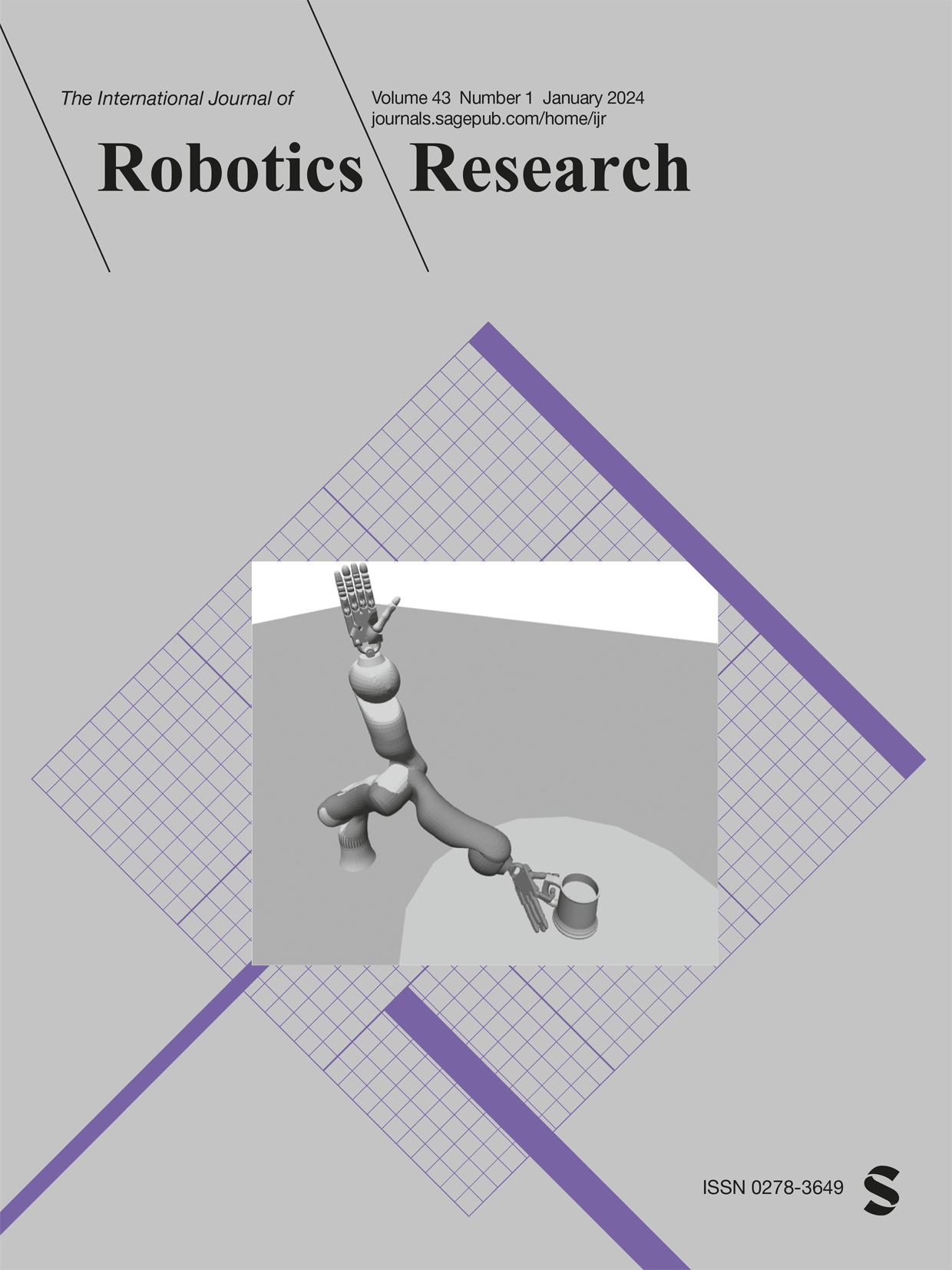Bayesian iterative closest point for mobile robot localization
IF 5
1区 计算机科学
Q1 ROBOTICS
引用次数: 2
Abstract
Accurate localization of a robot in a known environment is a fundamental capability for successfully performing path planning, manipulation, and grasping tasks. Particle filters, also known as Monte Carlo localization (MCL), are a commonly used method to determine the robot’s pose within its environment. For ground robots, noisy wheel odometry readings are typically used as a motion model to predict the vehicle’s location. Such a motion model requires tuning of various parameters based on terrain and robot type. However, such an ego-motion estimation is not always available for all platforms. Scan matching using the iterative closest point (ICP) algorithm is a popular alternative approach, providing ego-motion estimates for localization. Iterative closest point computes a point estimate of the transformation between two poses given point clouds captured at these locations. Being a point estimate method, ICP does not deal with the uncertainties in the scan alignment process, which may arise due to sensor noise, partial overlap, or the existence of multiple solutions. Another challenge for ICP is the high computational cost required to align two large point clouds, limiting its applicability to less dynamic problems. In this paper, we address these challenges by leveraging recent advances in probabilistic inference. Specifically, we first address the run-time issue and propose SGD-ICP, which employs stochastic gradient descent (SGD) to solve the optimization problem of ICP. Next, we leverage SGD-ICP to obtain a distribution over transformations and propose a Markov Chain Monte Carlo method using stochastic gradient Langevin dynamics (SGLD) updates. Our ICP variant, termed Bayesian-ICP, is a full Bayesian solution to the problem. To demonstrate the benefits of Bayesian-ICP for mobile robotic applications, we propose an adaptive motion model employing Bayesian-ICP to produce proposal distributions for Monte Carlo Localization. Experiments using both Kinect and 3D LiDAR data show that our proposed SGD-ICP method achieves the same solution quality as standard ICP while being significantly more efficient. We then demonstrate empirically that Bayesian-ICP can produce accurate distributions over pose transformations and is fast enough for online applications. Finally, using Bayesian-ICP as a motion model alleviates the need to tune the motion model parameters from odometry, resulting in better-calibrated localization uncertainty.移动机器人的贝叶斯迭代最近点定位
机器人在已知环境中的精确定位是成功执行路径规划、操纵和抓取任务的基本能力。粒子滤波器,也被称为蒙特卡罗定位(MCL),是一种常用的方法来确定机器人在其环境中的姿态。对于地面机器人来说,嘈杂的车轮里程计读数通常被用作预测车辆位置的运动模型。这样的运动模型需要基于地形和机器人类型来调整各种参数。然而,这种自我运动估计并不总是适用于所有平台。使用迭代最接近点(ICP)算法的扫描匹配是一种流行的替代方法,为定位提供自我运动估计。迭代最近点计算在这些位置捕获的给定点云的两个姿态之间的变换的点估计。作为一种点估计方法,ICP不处理扫描对准过程中的不确定性,这些不确定性可能是由于传感器噪声、部分重叠或存在多个解而产生的。ICP面临的另一个挑战是对齐两个大点云所需的高计算成本,这限制了其适用于动态性较低的问题。在本文中,我们通过利用概率推理的最新进展来应对这些挑战。具体来说,我们首先解决了运行时间问题,并提出了SGD-ICP,它采用随机梯度下降(SGD)来解决ICP的优化问题。接下来,我们利用SGD-ICP来获得变换上的分布,并提出了一种使用随机梯度Langevin动力学(SGLD)更新的马尔可夫链蒙特卡罗方法。我们的ICP变体,称为贝叶斯ICP,是该问题的完整贝叶斯解决方案。为了证明贝叶斯ICP在移动机器人应用中的优势,我们提出了一种自适应运动模型,该模型使用贝叶斯ICP来生成蒙特卡洛定位的建议分布。使用Kinect和3D LiDAR数据的实验表明,我们提出的SGD-ICP方法实现了与标准ICP相同的溶液质量,同时显著提高了效率。然后,我们根据经验证明,贝叶斯ICP可以在姿态变换上产生准确的分布,并且对于在线应用来说足够快。最后,使用贝叶斯ICP作为运动模型减轻了从里程计调整运动模型参数的需要,从而产生更好的校准定位不确定性。
本文章由计算机程序翻译,如有差异,请以英文原文为准。
求助全文
约1分钟内获得全文
求助全文
来源期刊
CiteScore
22.20
自引率
0.00%
发文量
34
审稿时长
6-12 weeks
期刊介绍:
The International Journal of Robotics Research (IJRR) has been a leading peer-reviewed publication in the field for over two decades. It holds the distinction of being the first scholarly journal dedicated to robotics research.
IJRR presents cutting-edge and thought-provoking original research papers, articles, and reviews that delve into groundbreaking trends, technical advancements, and theoretical developments in robotics. Renowned scholars and practitioners contribute to its content, offering their expertise and insights. This journal covers a wide range of topics, going beyond narrow technical advancements to encompass various aspects of robotics.
The primary aim of IJRR is to publish work that has lasting value for the scientific and technological advancement of the field. Only original, robust, and practical research that can serve as a foundation for further progress is considered for publication. The focus is on producing content that will remain valuable and relevant over time.
In summary, IJRR stands as a prestigious publication that drives innovation and knowledge in robotics research.

 求助内容:
求助内容: 应助结果提醒方式:
应助结果提醒方式:


